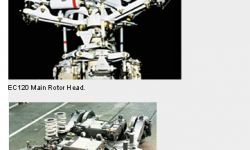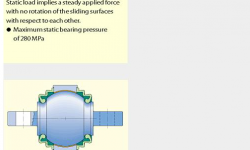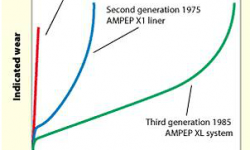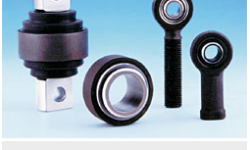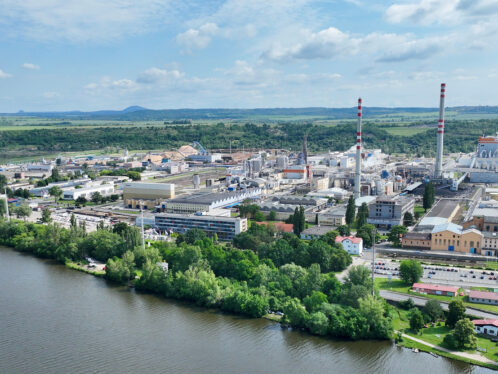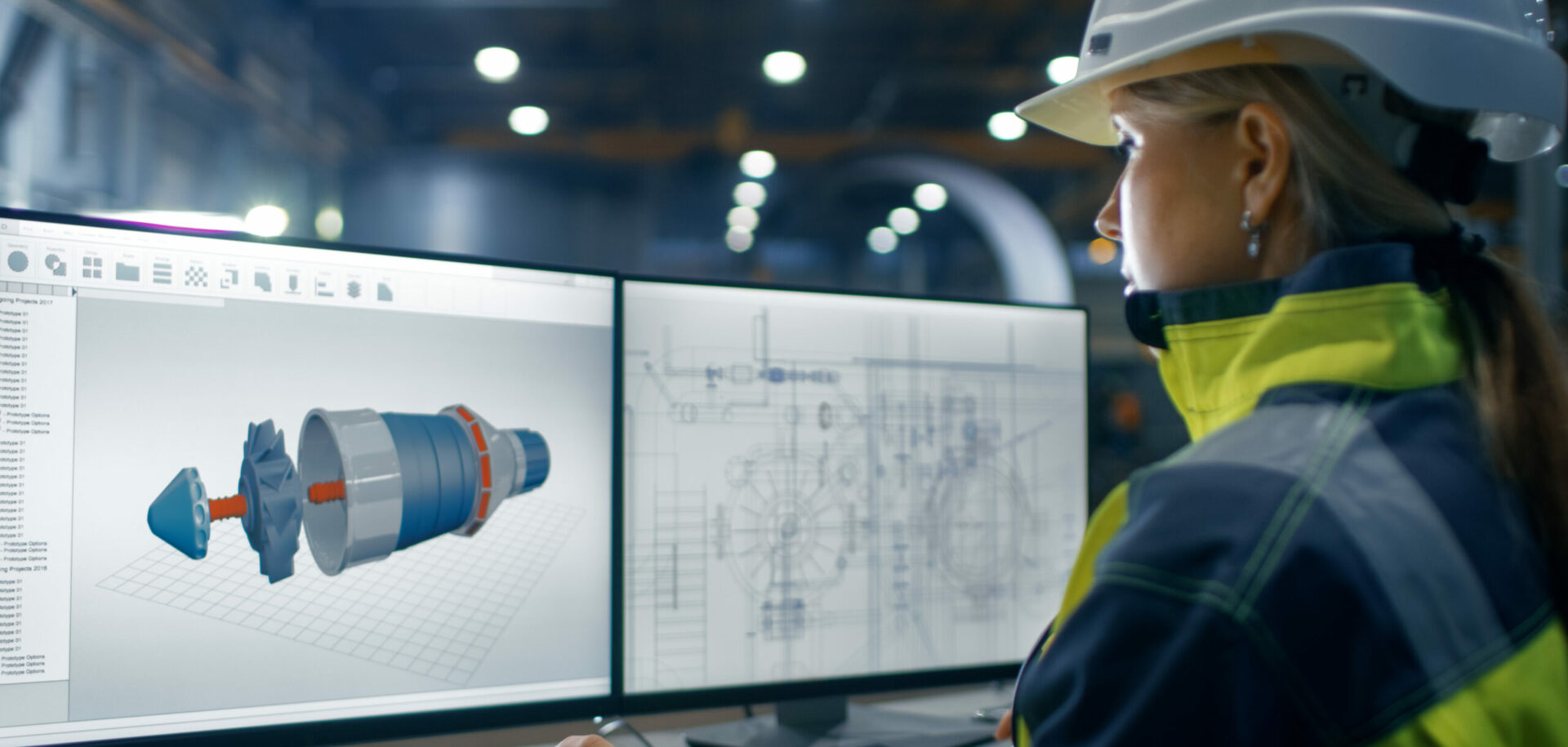
Summary
AMPEP self-lubricating plain bearings are suitable for applications where bearing pressures are high, movement is slow and maintenance is difficult or impossible. They are used extensively in fixed-wing aircraft and helicopter airframe and flight control systems. Plain bearings are also found in a wide range of applications, particularly on advanced mass transit systems, high-performance cars, military vehicles, marine equipment and power generation equipment.
AMPEP, part of the SKF group, is a specialist and has a leading position in the manufacture and design of high technology self-lubricating plain bearings for aerospace and industrial markets. AMPEP plain bearings have many distinct and valuable advantages, providing solutions to a variety of difficult applications. Such plain bearings are maintenance-free, operating without lubrication whilst tolerating many lubricating and non-lubricating fluids.
Other product characteristics include a wide operating temperature range from
-50 to +200 ?C, a very high ratio of bearing stress to mass, minimum stick slip, relatively low coefficient of friction, high resistance to wear and tolerance of solid contamination, all coupled with low life cycle cost.
AMPEP self-lubricating plain bearings are ideal for applications where bearing pressures are high, movement is slow and maintenance is difficult or impossible.Plain bearings are used extensively in fixed-wing aircraft and helicopter airframe and flight control systems. In general industry, plain bearings have been used in a wide range of applications, particularly in advanced mass transit systems, high-performance cars, military vehicles, marine equipment and power generation equipment.
Part of the SKF group since 1988, AMPEP is located in the UK and specialises in the design and manufacture of high-technology self-lubricating plain bearings for aerospace and industrial markets. The company continues to invest in advanced technology, machine tools, computer-aided engineering and research and development to maintain the company’s leading position.
AMPEP is approved by the Joint Aviation Authorities (JAA) and is approved as a Ministry of Defence (MOD) supplier through third-party surveillance to ISO 9002 in accordance with Aerospace Sector Certification Scheme TS 157. The company also is approved by many European aerospace and high-technology industrial companies. AMPEP has held SNCF (French railways) approval AQF 2 certification since 1993.
Low friction, low wear
AMPEP self-lubricating plain bearings are high-quality products that provide low coefficient of friction combined with low wear rates. A self-lubricating plain bearing consists of three components:
- one-piece outer ring;
- PTFE / glass liner system; and
- ball or inner ring.
The one-piece outer ring is formed around the spherical shape of the inner ring during the manufacturing process and contains no splits or loader slots. This ensures excellent conformity of the mating surfaces. The bearing liner, AMPEP X1, is based on a woven polytetrafluoroethylene (PTFE) / glass fabric laminated under heat and pressure with a phenolic resin-impregnated glass cloth. The oscillating movement of the bearing causes the spherical surface to be continuously smeared with a film of PTFE during the life of the bearing. Various liner counterface combinations give different performance levels and can satisfy very stringent application criteria.
The plain bearings incorporate woven PTFE / glass liners, which provide low coefficient of friction combined with low wear rates. Fiberslip, the original liner material, has a bearing surface of woven PTFE. The AMPEP X1 liner system has been developed from Fiberslip. It differs in textile design and offers improved wear characteristics. The AMPEP X1 liner system is qualified to American Aerospace Standard SAE AS81820 and is extensively used in aerospace and industrial applications.
AMPEP XL bearings are the result of an extensive development programme to produce acceptable lifespan in arduous aerospace applications. They exceed international standards by a considerable margin, thus ensuring long life and reliability. The AMPEP XL liner system employs superfinished hard coatings on the counterface. Counterface variants include super finished through hardened steel, hard chrome and other coatings appropriate to the application and performance required. The bearings are manufactured from high-quality carbon or corrosion-resistant steels to meet the demand for high reliability and low life cycle cost.
Technical features
Liner wear is primarily a function of bearing pressure, surface velocity and sliding distance at a given temperature. Other life factors are:
- surface finish of liner counterface (Life increases with improved surface finish.);
- hardness of liner and counterface (Generally, the harder the surface the longer the life of the bearing. The surface should be hardened and corrosion-resistant.);
- good conformity (contact area) between the liner and counterface to maximise bearing life; and
- absence of contaminants (These increase wear. If water contamination is likely, the bearing should be sealed).
In laboratory compression tests, AMPEP Fiberslip flat pads, bonded to high-strength steel, have been subjected to pressures in excess of 700 MPa before structural failure occurred. These values were obtained for a single, steadily applied force. Most common metallic materials will undergo compressive yield before the AMPEP bearing liners fail.
Impulse or live loads with no appreciable movement at the bearing surface do not usually cause wear. Under the following conditions, a test to assess the effect of vibration on bearing backlash produced no detectable increase in bearing clearance.
- Bearing pressure 160 MPa ± 10 MPa, 20 million cycles with an applied frequency of 30 Hz
- Bearing pressure 160 MPa ± 20 MPa, 0.5 million cycles with an applied frequency of 30 Hz
Under these conditions, only a light smoothing of the bearing liner and a reduction in torque is to be expected.
The friction coefficient decreases at fixed sliding speeds with increasing bearing pressure, reaching a minimum at 70 MPa. Friction coefficient increases with decreasing temperature and increased sliding velocity.
Application areas
Self-lubricating plain bearings are widely used in railway and aerospace applications. AMPEP self-lubricating bearings have been used in rail bogie suspension systems for 30 years. Applications include torsion bars (anti-roll bars), damper attachment points, swing links, brake mechanisms, steering linkages, valve linkages, couplings (tailpins and auto couplers) and tilt mechanisms for high-speed trains.
Fixed-wing aircraft, helicopter airframe and flight control systems are long-standing aerospace uses. Applications include main rotor track rods, tail rotor pitch links, main rotor blade dampers and low-torque bearings for manual controls.
Operating experience
In a typical rail bogie suspension system where extended lives are required, bearing pressures of 3.5 to 20 MPa are encountered, together with angles of oscillation of ± 1° at 30 Hz to ± 5° at 0.1 Hz. Under these demanding conditions, operating lives in excess of 2.2 million kilometres of travel are obtained.
Wear in the bearing occurs as a result of movement between the mating surfaces under pressure. An accurate analysis of the duty cycle in any particular application is essential if realistic lives are to be predicted and obtained.
AMPEP bearings are manufactured with a preload and closely controlled conformity between the mating surfaces of the inner and outer ring. When fitting a spherical plain bearing to its housing, the bearing should be pressed to its seating using a special tool. To assist correct alignment, a 1 x 15° chamfer should be machined at the edge of the housing bore and at the end of the shaft. Load must never be applied to the ball face as this can have an adverse affect on the bearing conformity.
The coefficient of friction for AMPEP bearings is approximately 0.05–0.1 at the bearing pressures encountered in rail applications. Thus, it is necessary to use an adhesive or to clamp the bearing to prevent bearings rotating in their housings or on their pins. When using an adhesive it is important to seek guidance from the adhesive manufacturer, because preparation and cleanliness of mating surfaces are essential.
An example of a typical industrial application for self-lubricating plain bearings is on the intercoach dampers and anti-roll bar of French TGV high-speed trains operated by SNCF. Illustrated above is an example of the EUROSTAR. AMPEP bearings can be used in all linkages. These bearings are subject to cyclic rotations under loads, which vary with the rate of tilt and track conditions. A typical aerospace application for self-lubricating plain bearings is illustrated in the EC 120 helicopter. The EC 120, developed by EUROCOPTER in cooperation with China and Singapore, was officially launched during Helicopter Association International 1997 (HAI Heli-Expo), and has since been sold around the world. It is a lightweight single-engine helicopter with five seats and a large cargo hold. The helicopter is both fast and quiet, making it suitable for a wide variety of roles including charter flights, aerial film coverage, surveillance missions and training of military pilots. Helicopter flight controls are a well-established application for AMPEP bearings. Each blade angle is continuously adjusted during flight, requiring motion of the pitch links and their bearings with every revolution of the rotor head. These bearings are subject to cyclic rotations and misalignment.
In conclusion, AMPEP plain bearings have many distinct and valuable advantages, which provide solutions to a variety of difficult applications. Such plain bearings are maintenance-free, operating without lubrication whilst tolerating many lubricating and non-lubricating fluids. Other product characteristics include a wide operating temperature range from -50 up to +200 °C, a very high ratio of bearing stress to mass, minimum stick slip, relatively low coefficient of friction, high resistance to wear and tolerance of solid contamination, all coupled with low life cycle cost.
To further extend the life of AMPEP bearings, the AMPEP XLNT ceramic system has been recently introduced. This offers a marked increase in wear resistance in many bearing applications, giving customers additional improvements in service life and reliability.
Gottfried Kure,
SKF global railway marketing, Austria,
and Andy Vicarage, AMPEP plc, Clevedon, UK


